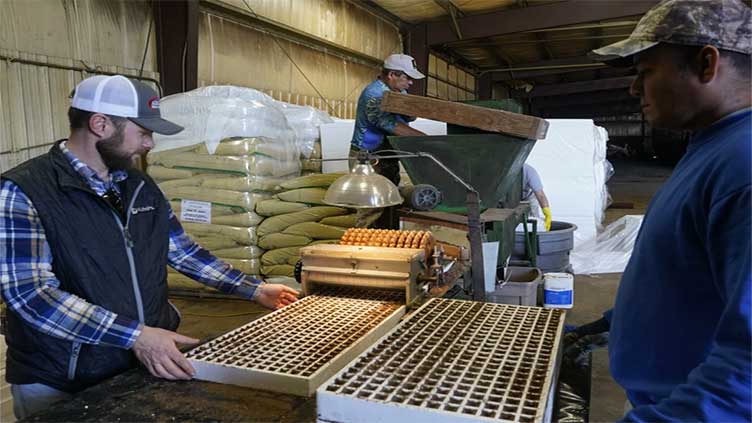US farms are increasingly reliant on contract workers who are acutely exposed to climate extremes

World
US farms are increasingly reliant on contract workers who are acutely exposed to climate extremes
NEW YORK (AP) - Six years ago, Illinois farmer John Ackerman didn’t hire any contract workers at all. Now he typically hires about 22 every year through a local coordinator that helps farmers hire crews of agriculturally skilled, often Latino workers. Those teams hand-weed the soybeans Ackerman grows alongside the pumpkin and corn crops he uses for his primarily fall-focused agrotourism outfit.
He still hires about the same number of locals, around 25 part-time workers in the fall, many of them teenagers or young adults, to run sales and pick pumpkins. He enjoys mentoring young people, but says it’s felt harder lately to justify hiring inexperienced workers when contract workers do the same hard, physical jobs faster and better.
“I worry about the day that comes where it’s a better choice to have contract laborers come and help me” year-round, he said.
A higher proportion of U.S. farms are now using contract workers, according to the most recent U.S. agricultural census data, out last month with a five-year update from the previous 2017 data. Because of the terms of their employment, those laborers have specific challenges voicing concerns about their working conditions, and are more likely to be on the front lines of climate change, facing increasing heat and extreme weather. Climate change affects all farm workers, but advocates and researchers say this is a reason to focus particularly on these workers.
The U.S. Department of Agriculture defines contract labor as including contractors, crew leaders, cooperatives, or any other organization hired to furnish a crew to do a job for one or more agricultural operations. The USDA data showed an uptick in the number of farms using migrant labor, both within farms that already hired contract workers and overall.
Contract workers hired by an agency may work hundreds of miles from where they live, and may move from place to place, making it harder to keep farmers accountable for labor abuses, explained Alexis Guild, vice president of strategy and programs at the nonprofit Farmworker Justice. Some contracting agencies also employ undocumented workers, who may remain silent for fear of being deported. And though some steps are being taken at the federal level to protect migrant workers with H-2A visas for seasonal farm jobs, those regulations have vocal opponents.
Since the immigration status of many H-2A workers is tied to a single job, they may feel they have less agency to voice concerns about their workplaces, added Rebecca Young, director of programs at Farmworker Justice. She said these workers can be isolated from their communities due to language barriers and their living arrangements, often on the same farms where they work. Resources like healthcare and counseling can be out of reach.
“I worry about some of our most vulnerable populations who have contract jobs that don’t have very good protections in place being more exposed to worse conditions,” said Jennifer Vanos, an associate professor at Arizona State University who studies climate and health with a focus on extreme heat. She emphasized that it’s “a scary situation because people die and that’s just not okay.”


